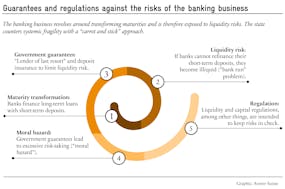Today’s consumer protection rules cover virtually every aspect of life, stretching far beyond health and product safety where they started. In more recent years, protecting the consumer has become a popular political topic.
Looked at purely technologically, matters should have gone the other way. The rapid spread of information and computer technology has “empowered” consumers. Information about millions of products is easily available and accessible at very low cost. Given consumer protection policy was based historically on assumptions of poorly informed consumers requiring protection against exploitation and malpractice, such thinking seems anachronistic now.
Outdated tasks
Switzerland has four “official” consumer organizations, all subsidized by the Confederation to the tune of about 1 million Swiss francs per year. Collectively they comprise the Associazione Consumatrici e Consumatori delle Svizzera Italiana (ACSI), covering Italian spekaing Switzerland, the Fédération Romande des Consomateurs (FRC) for French speaking areas, and the Konsumentenforum (KF) in German speaking regions, alongside with the Stiftung für Konsumentenschutz (SKS).
When the consumer protection groups were founded some 25 years ago, they were assigned three tasks: information and advice to consumers, implementation of comparative tests and the conclusion of so called “declaration agreements” with industry associations.
Today, the first field is covered by a large number of commercial and non-commercial services that do not require state subsidies (see figure). In the second, comparative tests are no longer part of the daily business of consumer organizations. And in the third, declaration agreements are no longer significant. All that suggests the original justification for subsidizing consumer protection groups is largely outdated. Avenir Suisse has been calling for the abolition of financial aid for some time.
Missed opportunity for an important debate
In November 2017, the Finance Commission of the Swiss National Council (lower chamber of parliament) proposed the gradual elimination of federal funds for consumer protection groups (as one of around 80 austerity measures). Its plan envisaged reducing help to 500000 Swiss francs in 2018 and to zero from 2019.
However, the proposal did not stand a chance, and was rejected by around 110 votes to 80. Admittedly, saving 1 million francs a year on a federal budget of 70 billion Swiss francs is a drop in the ocean. The federation spends far more on less reasonable things than consumer protection. However, this does not change the fact that the federal government continues to provide financial assistance that no longer serves its purpose and discriminates against non-subsidized sources of information for consumers.
The savings proposal would have been an excellent occasion to debate how state-supported consumer protection should be sensibly pursued in the digital age. That opportunity was missed.





